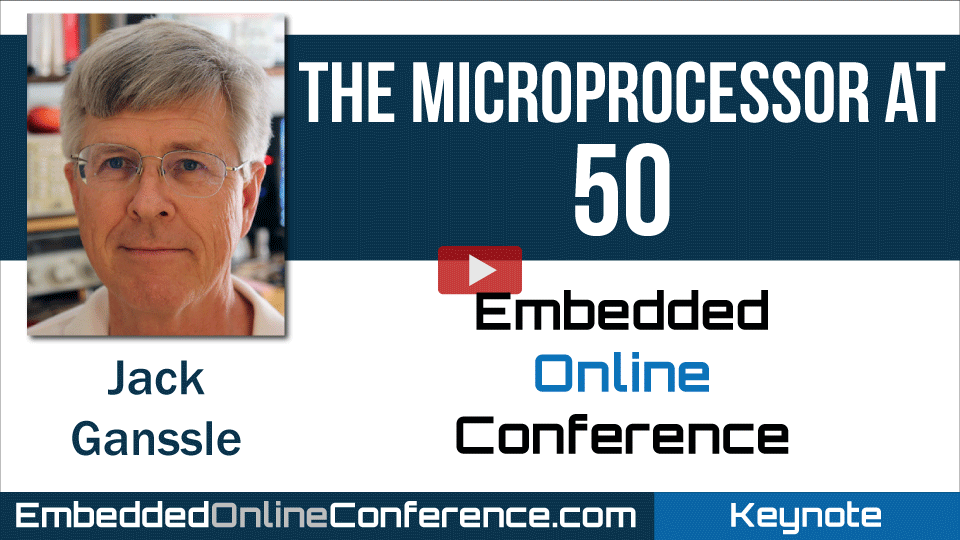Home > On-Demand Archives > Keynote Presentations >
The Microprocessor at 50
Jack Ganssle - Watch Now - EOC 2021 - Duration: 35:40

FWIW: I get them regularly and recently.
Wow the Q/A is even better than the keynote that was great! Great advice! 1: Save your money to avoid being a "slave to the man" and work at small companies. 2: Mitigate against the age of constant disruption by having a weekly time of new tech learning. 3: Be both Broad and Deep (avoid narrow only obsolescence - Lunar Tire Expert dilemma). And I agree with you on Jean's documentation. I still recommend Jean's books to new Engineers to see how to do it and keep them on my own shelf.
Great questions!
As a long-time follower of your work, I greatly enjoyed your presentation. I feel like we are so often caught up in the daily struggles to produce/create/manage, that it is easy to lose sight of the big picture. You do a wonderful job of bringing the wonders of that big picture into focus. An appreciation of how we got here is crucial to appreciating where we are.
I find it interesting how history repeats itself. We have tera and petabytes of information and/or storage. Yet, today, I feel I see more and more where we try to reduce the code due to security and speed. Your thoughts?
Data is growing exponentially; code isn't as we have limited bandwidth from our brains to the IDE. Security means, in part, having code that is tractable yet packages like Windows are enormous... with lots of vulnerabilities. "They" want more functionality but are unwilling to pay for security. This has to change.
TRUTH. Then, they scream when they are breached and have 100 phone apps of which they use 1%. Same with computers. How many unnecessary apps are on them that we don't use and they come with?
Hi Jack, thanks for the talk. I asked this on the Q&A but Jacob didn't get to it. What do you think about the sheer electronic waste that the consumer electronics industry generates? How do you think we can make technology a force for good in the world? -- from an idealistic young engineer
I'm not optimistic. The 2nd law of thermodynamics works against us - it's just too costly to recover much of this material. When we toss our phones every couple of years we do a disservice to the environment. And manufacturing this stuff is dirty - TSMC uses gobs of water yet Taiwan is having a water crisis.
Can you provide a list of the websites you study and books to buy? Thank you.
A very interesting and well considered walk down history lane. (some of which I experienced first hand as well). Thank you for a great presentation.
Bob in Cleveland, OH
Jack is a true gem for the industry. I totally enjoyed his talk (I always enjoy all his talks). Incredibly interesting and it's impressive how computing evolved in the 100 or so past years. Thanks for doing this.
This was truly an amazing journey, your storytelling, research and humor throughout the presentation made it a very pleasant experience. Thank you!!
Jack,
I always enjoy listening to you (or reading) on any topic you cover. Your wealth of knowledge and expertise shines through every time. This one was no different; Great presentation!
I still have a pair of 8" floppy drives I bought there in the late 70s... sitting in the closet in this room.
8" floppies! I bet you could store hours of HD video on them... or something!
IIRC, the capacity (in CP/M) was <256kbytes.
As I recall NEC came out with the 765, one of the first floppy controllers. It was a bear to use and the datasheet was wildly inaccurate.
My Tarbell S-100 FDC board uses the WD 1771; also a very early LSI implementation.
I think the single density ones were 80 KB, at least when they first came out.
Would that surplus store have been Eli Hefron's ? From another antique nerd...
Could be - it was so long ago I don't remember!

























That reminds me, I haven't received any Gansssle embedded newsletter for a long time now... is it just me?